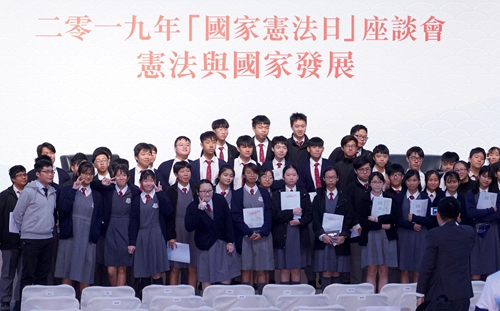HK school head proposes separate course for HK nat’l security law
By GT staff reporters Source:Global Times Published: 2020/6/27 22:43:40
Distinct nat’l security course urged

Students pose for photos after attending a National Constitution Day symposium at the Hong Kong Convention and Exhibition Centre in 2019. Professors from the mainland and HK universities, members from the Standing Committee of the National People's Congress were invited to speak. Photo: VCG
The education authority in the Hong Kong Special Administrative Region (SAR) plans to introduce the national security law for Hong Kong to students through courses to enhance patriotism and correct the "wrong thoughts" of young people.
The local education bureau will study how to help students better understand the significance of the law, its key content, and the influence on young people after the legislation takes effect, Hong Kong Secretary for Education Kevin Yeung Yun-hung told media on Friday.
Introducing the national security law is necessary to protect youth against the lies of opposition and extreme forces, Hong Kong-based education experts said.
They think a general introduction is far from enough, and suggested that authorities include the national security law in compulsory courses, textbooks and exams.
Wong Kam-leung, the chairman of the Hong Kong Federation of Education Workers, believes that subjects such as liberal studies and Chinese history in middle and high schools, and general studies in primary schools, should include the national security law.
With the introduction of the law, relevant national education should be incorporated in textbooks to strengthen the students' sense of national identity, Wong told the Global Times on Saturday.
Tang Fei, a member of the Chinese Association of Hong Kong and Macao Studies and principal of Hong Kong's Heung To Secondary School, believes the national security law should be an independent course.
Fifty-one hours in three years of Basic Law education is required in secondary schools, which is scattered in different subjects such as history and geography. But the education authority does not supervise related education, Tang told the Global Times.
"Such an education measure lacks systematization and organization, and in practice, it only depends on schools with no supervision," he said.
Wong said the Education Bureau has already worked on new materials on the Basic Law and the Constitution, which are expected to be given to students in September.
The SAR government doesn't play the role of an onlooker but a gatekeeper in terms of education issues, Chief Executive Carrie Lam Cheng Yuet-ngor said on Twitter on June 15, where she condemned separatist groups for instigating strikes against the national security law as utilizing students for their political ends.
Lam said she expects [government] to make joint effort with families and schools to turn young Hongkongers into "a new generation with a motherland concept, Hong Kong feelings, international vision and social responsibility."
The idea of introducing the national security law to Hong Kong students was welcomed on social media in the Chinese mainland, with many netizens saying studying the national security law is crucial in solving the long-standing problems in Hong Kong's education system, which has indirectly led to a weak national identity among local students.
"Hong Kong must cultivate healthy values and choices in students to prevent them from blindly opposing China," a Weibo user said on Saturday.
In May, Lam said the local government would deal with the controversial liberal studies by the end of the year, which was widely considered "biased education" known for inciting anti-mainland sentiment among Hongkongers by setting inappropriate exam questions. This included one which asked whether Japan did more good than harm to China between 1900 and 1945. That question had sparked outrage in Hong Kong and the mainland.
"It's regrettable that many young people in Hong Kong have little knowledge and recognition of their motherland's history, culture and development, but are keen on mouthing empty Western-style slogans," one mainland netizens said on Weibo.
Some suggested Hong Kong invite mainland teachers, including law professors, to improve Hong Kong students' national identity.
Chinese mainland teachers in Chinese language studies, history and math have been invited to Hong Kong and Macao since 2008 to participate in local curriculum building and research.
Wong said it is critical to train Hong Kong teachers on the national security law for Hong Kong, and suggested sending them to the mainland for training.
Posted in: HK/MACAO/TAIWAN